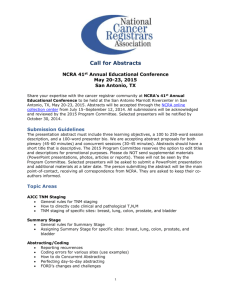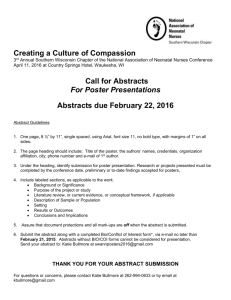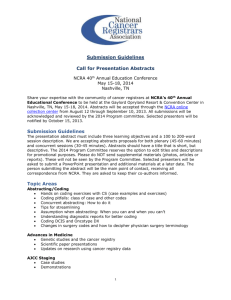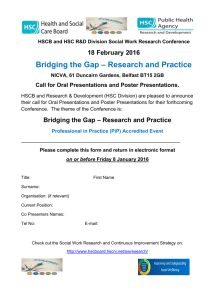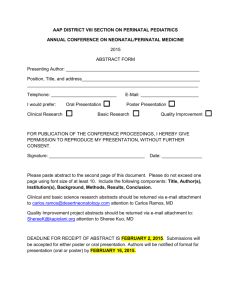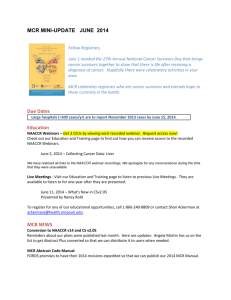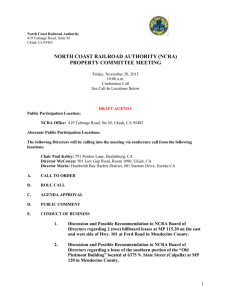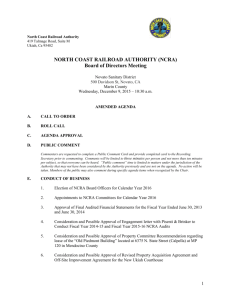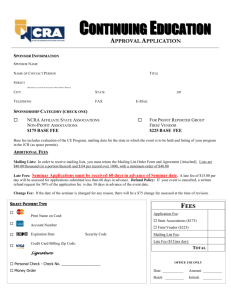2016CallforAbstracts_SubmissionGuidelinesandTopics
advertisement
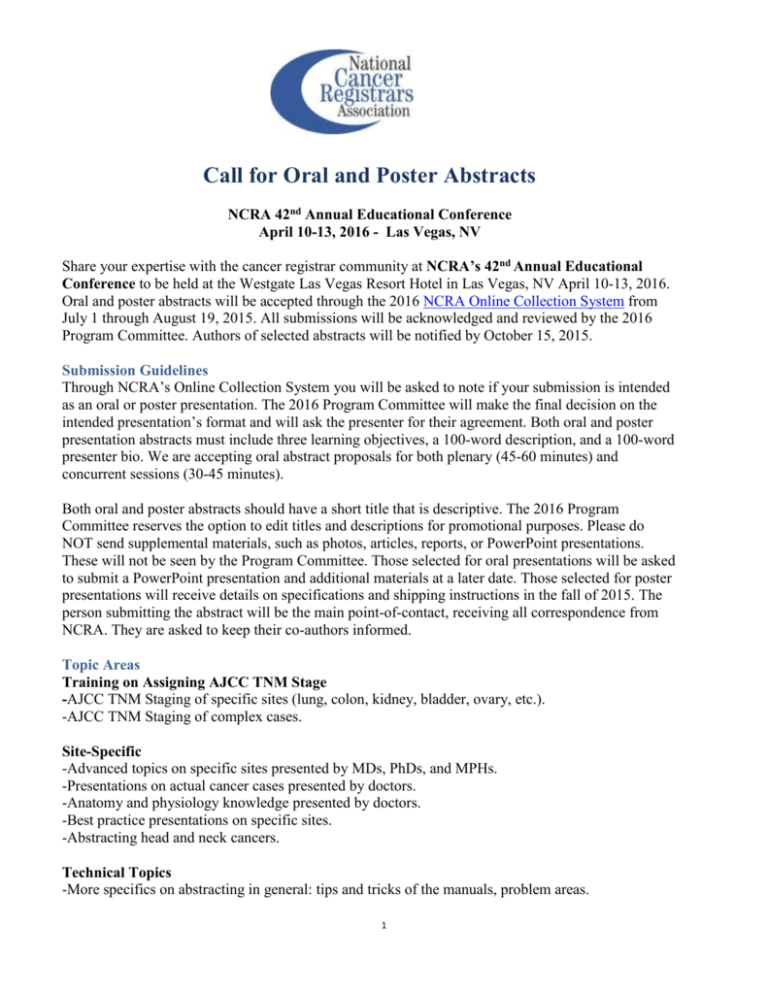
Call for Oral and Poster Abstracts NCRA 42nd Annual Educational Conference April 10-13, 2016 - Las Vegas, NV Share your expertise with the cancer registrar community at NCRA’s 42nd Annual Educational Conference to be held at the Westgate Las Vegas Resort Hotel in Las Vegas, NV April 10-13, 2016. Oral and poster abstracts will be accepted through the 2016 NCRA Online Collection System from July 1 through August 19, 2015. All submissions will be acknowledged and reviewed by the 2016 Program Committee. Authors of selected abstracts will be notified by October 15, 2015. Submission Guidelines Through NCRA’s Online Collection System you will be asked to note if your submission is intended as an oral or poster presentation. The 2016 Program Committee will make the final decision on the intended presentation’s format and will ask the presenter for their agreement. Both oral and poster presentation abstracts must include three learning objectives, a 100-word description, and a 100-word presenter bio. We are accepting oral abstract proposals for both plenary (45-60 minutes) and concurrent sessions (30-45 minutes). Both oral and poster abstracts should have a short title that is descriptive. The 2016 Program Committee reserves the option to edit titles and descriptions for promotional purposes. Please do NOT send supplemental materials, such as photos, articles, reports, or PowerPoint presentations. These will not be seen by the Program Committee. Those selected for oral presentations will be asked to submit a PowerPoint presentation and additional materials at a later date. Those selected for poster presentations will receive details on specifications and shipping instructions in the fall of 2015. The person submitting the abstract will be the main point-of-contact, receiving all correspondence from NCRA. They are asked to keep their co-authors informed. Topic Areas Training on Assigning AJCC TNM Stage -AJCC TNM Staging of specific sites (lung, colon, kidney, bladder, ovary, etc.). -AJCC TNM Staging of complex cases. Site-Specific -Advanced topics on specific sites presented by MDs, PhDs, and MPHs. -Presentations on actual cancer cases presented by doctors. -Anatomy and physiology knowledge presented by doctors. -Best practice presentations on specific sites. -Abstracting head and neck cancers. Technical Topics -More specifics on abstracting in general: tips and tricks of the manuals, problem areas. 1 -Physician presentation on cutting-edge treatments. -Treatment guidelines for most common cancers. -Details on special tests (i.e. Oncotype DX, ALK, EGFR) -Pathology related topics/markers, staining (what does it mean) -Genetic testing, clinical trials. -Different types of radiation treatment modalities -RQRS training. -NCDB tools training: CP3R, Survival Reports, Comparison Benchmarks, etc. -How to help small facilities w/ limited budgets perform RQRS. -Grading histology. -High-quality data collection and how to achieve it. Data/Informatics -Informatics and how to present/display market cancer registry data. -Physician perspectives on cancer registry data and how they use it. -How cancer registrars can better utilize data and improve interactions with the administration. -Data analytics and how registrars can use the data to get more recognition. -Best practices presentation on how cancer registry data are being used. -How registries are making Meaningful Use work. -How registries are making e-Path work. -How to approach a clean-up of a cancer registry database that has been neglected. -Automated or targeted consolidation. -Statistical instruction. -How to capture recurrence information in an organized and methodical manner. -Quality metrics Professional Development/Registry Management/Staffing -Report on the State of the Profession. Where are we? Update on Department of Labor’s SOC classification for cancer registrars; how are we increasing awareness of cancer registry as a career; what impact did three testing windows for the exam vs. two accomplish; what is the current shortfall of CTRs; and what is forecasted? -Recruitment of new registrars. -Day-to-day practices of running registries. -Ways on how to break old habits. -Surviving/thriving with personnel shortages. CoC -Survey Process -CoC Accreditation -CoC Q&A -CoC Specific Sessions (Survey Savvy, Accreditation 101) -More ways to show value for a CoC-Accredited Program -CoC/NAPBC Standards: most common errors and deficiencies -Cancer Committee -Accreditation standards and data collection requirements 2 Survivorship -Survivorship Care Plans: need to better understand how this is being met by facilities Misc. -Resources on how to efficiently use technology. -Different approaches to quality control. -Follow-up processes: how people do it and what resources they use. 3
